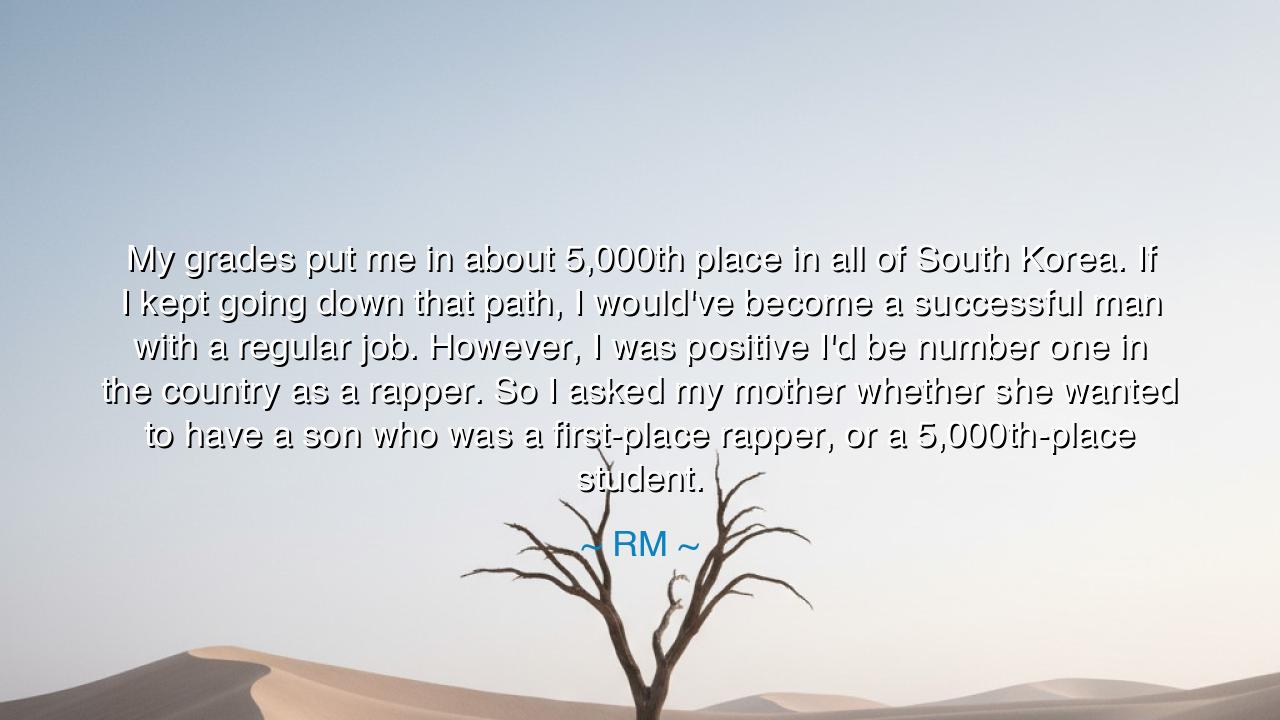
My grades put me in about 5,000th place in all of South Korea.
My grades put me in about 5,000th place in all of South Korea. If I kept going down that path, I would've become a successful man with a regular job. However, I was positive I'd be number one in the country as a rapper. So I asked my mother whether she wanted to have a son who was a first-place rapper, or a 5,000th-place student.






The words of RM—“My grades put me in about 5,000th place in all of South Korea. If I kept going down that path, I would’ve become a successful man with a regular job. However, I was positive I’d be number one in the country as a rapper. So I asked my mother whether she wanted to have a son who was a first-place rapper, or a 5,000th-place student.”—speak with the fire of destiny, the cry of a soul unwilling to settle for the ordinary. These words are not merely about school or music, but about the eternal struggle between conformity and calling, between the safe path of predictability and the perilous road of passion.
In this declaration, RM reveals a truth known to the ancients: that greatness often begins in defiance of expectation. Society measures worth in ranks, numbers, and grades; yet the spirit knows that such measures cannot capture the depth of talent or the reach of dreams. To be 5,000th-place in academics was, by worldly standards, to be unremarkable. But within his heart burned the certainty of another measure, another path—one that led not to stability, but to transformation. His vision was not of safety, but of glory.
History gives us countless reflections of this same spirit. Consider the young Vincent van Gogh, who failed as a preacher and a teacher, and who was judged unfit for the conventional paths laid before him. By the world’s measure, he was a failure. Yet in his art—dismissed at the time, but revered now—he became not the 5,000th painter of his generation, but among the greatest the world has ever known. So too RM chose not to chase the safe but limited definition of success, but to become the master of a path that only he could walk.
His boldness is also a dialogue with family, with society itself. To ask his mother whether she wanted a “first-place rapper” or a “5,000th-place student” was more than a child’s plea—it was a challenge. It was the courage to say: judge me not by the standards of the crowd, but by the fullness of who I can become. This echoes the ancient heroes, who often had to leave home, to step into exile or the unknown, in order to return transformed. It is a reminder that parents, teachers, and societies must sometimes release their grip on tradition to allow genius to flourish.
But RM’s words are not only about rebellion—they are about positivity and vision. He did not speak of becoming “better than average.” He spoke of being “number one in the country.” Such confidence is not arrogance, but the clarity of one who has glimpsed his own calling. This unwavering belief is itself a force of creation, for no man can rise to greatness unless he first believes, with all his being, that greatness is possible.
The lesson for us is clear: do not measure your worth only by the scales given to you. If your spirit calls you toward a different path, follow it with courage, even when others doubt. Yet also understand that belief must be paired with work; RM’s faith in his destiny was matched by years of labor, sacrifice, and persistence. Dreams are not excuses for idleness, but fires that demand constant tending.
So, dear listener, carry RM’s wisdom in your heart. Ask yourself: will you be content to be the 5,000th in a race not meant for you, or will you dare to be the first in the path only you can walk? Trust your calling, honor your uniqueness, and pursue it with relentless faith. For as RM shows us, positivity, courage, and vision can transform even the most ordinary beginnings into a destiny that inspires the world.






TNNguyen Thi Tuyet Nhi
This story raises an interesting psychological perspective: confidence and clarity of purpose seem as important as ability. RM’s certainty about being a top rapper drove his decision. I wonder how many people possess a talent but lack the self-belief to take risks. Could fostering a mindset of confidence and self-awareness be as critical in achieving success as skill or opportunity? How do we cultivate that kind of conviction without overestimating one’s abilities?
THMai Thuy Hang
Reading this, I feel inspired by RM’s determination, but I also feel curious about the societal pressures behind academic success in South Korea. Does this story suggest that systemic expectations can sometimes suppress individual potential? It makes me ask whether education systems should do more to recognize talents beyond traditional academics and support alternative career paths. Could valuing diverse skills early on help prevent talented individuals from feeling trapped by conventional measures of success?
HOHa Oanh
This quote makes me reflect on the role of parental support in pursuing non-traditional careers. How crucial was RM’s mother’s response in enabling him to follow his dream? Would a different answer have altered his path entirely? I also question how we balance practicality with ambition. Is it always reasonable to pursue a dream that’s less certain than a conventional career, and how do we evaluate the risk and potential reward?
A802. Thuy An 8/8
I find RM’s story both inspiring and thought-provoking. It raises questions about the traditional measures of success like grades versus pursuing passion and talent. I wonder how many people are discouraged from following their dreams because society emphasizes academic or conventional achievements. Could his approach encourage more young people to consider unconventional paths, or might it be risky for those without the same level of confidence or skill?